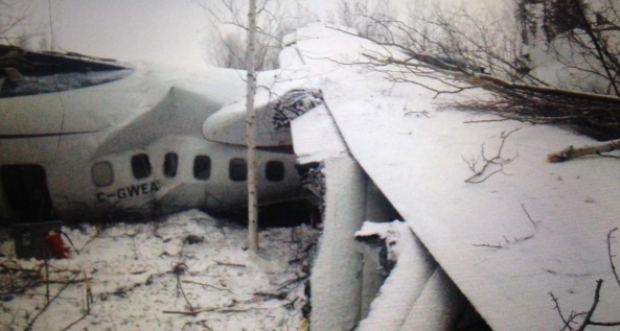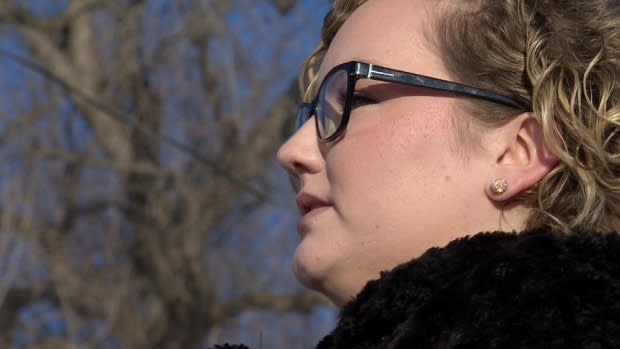'Everyone was screaming': Flight attendant recalls Fond du Lac crash, one year later
Miranda Jenny Tait could not see out any windows from her jump seat at the back of West Wind Flight 280.
As the plane tried to take off from Fond du Lac after dark on December 13, 2017, the 26-year-old flight attendant felt the turboprop aircraft shuddering, its tail soaring—then dropping, over and over.
Seconds later, it crashed.
"I could hear us taking down all these trees as we were going through the bush," said Tait. "Then I could just hear passengers screaming."

The impact ripped her seat from the wall, slamming Tait into the galley. The lone flight attendant stumbled to her feet as the plane came to a stop on its right side.
With three years of experience, Tait knew she had to assess conditions outside before attempting to evacuate the 22 passengers from the aircraft.
"When I got up to look into the cabin, it was just completely smashed in," Tait said. "You couldn't even walk down the aisle, all of the seats were just squished."
She tried to reach the main passenger door since it had stairs, but part of the aircraft had collapsed in front of it.
"People were screaming," Tait said. "There were a lot of very badly injured people."

With passengers at the front of the plane pinned out of reach of the emergency exits, Tait returned to the galley and started kicking at a small cargo door, which now faced the ground.
"I started kicking it from the top and I just kept kicking it and kicking it and kicking it until I just couldn't kick," Tait said.
Three men on the flight joined her, loosening the door from its hinges.
'I didn't know if it was fire or if it was help'
Tait emerged to see the plane's right wing on the ground, broken and leaking fuel.
"People started bunching up and pushing each other because this exit that we broke out was so small," said Tait. "And I couldn't hear anything from the front."
"I just kind of got them to throw their body on me so they wouldn't have to jump down."
She sent at least 17 passengers to the bush with a manifest, telling them to do a head count while she returned to the flight deck to figure out how to free the remaining crew and passengers.

Then she saw lights on the other side of the plane.
"I didn't know if it was fire or if it was help," Tait remembered.
There were still people trapped in the aircraft. -Jenny Tait, West Wind flight attendant
As Canadian Rangers from Fond du Lac approached on snowmobiles, she warned them about the fuel, asking them to use flashlights to guide passengers to safety.
"Everyone came out of the bush and they started getting on skidoos," said Tait. "But there were still people trapped in the aircraft."
When RCMP officers arrived, Tait sat on the tailgate of a truck, refusing to leave the scene until she saw one of the two pilots emerge from the wreckage.
"They had him in a stretcher and they were putting him in an ambulance," she said. "At that point I realized I couldn't walk."
One passenger, Arson Fern Jr, 19, died in hospital a few weeks after the crash. Nine other people were seriously injured.
On Friday in Saskatoon, the Transportation Safety Board of Canada will make safety recommendations based on its investigation to date.
'I was so thankful to be alive'
Tait spent two days at the hospital in Stony Rapids with a badly injured leg and a broken hand before she could return home to Saskatoon.
"Once I got into my hospital bed, I bawled," she said.
"I was so thankful to be alive."
Tait spent the next six weeks on crutches, and has undergone countless physiotherapy sessions since the crash.
She returned to the crash site in June for a healing ceremony with other crash survivors, but her doctors have not yet cleared her to return to work as a flight attendant.
"I have PTSD from the crash and from what I saw that night," said Tait. "I'm working on that."
West Wind Aviation's new chief executive officer called her efforts 'heroic'.
"She had a number of injuries that made it difficult for her to continue yet she continued on in her duties like a real pro," said Mike Rodyniuk.

He said Tait did "just an amazing job", and her efforts helped avert a far greater catastrophe for both the crew and passengers.
"It feels really good to hear that," said Tait, who has now returned to university to study social work.
"There's nothing that I could have done any differently," she said.

